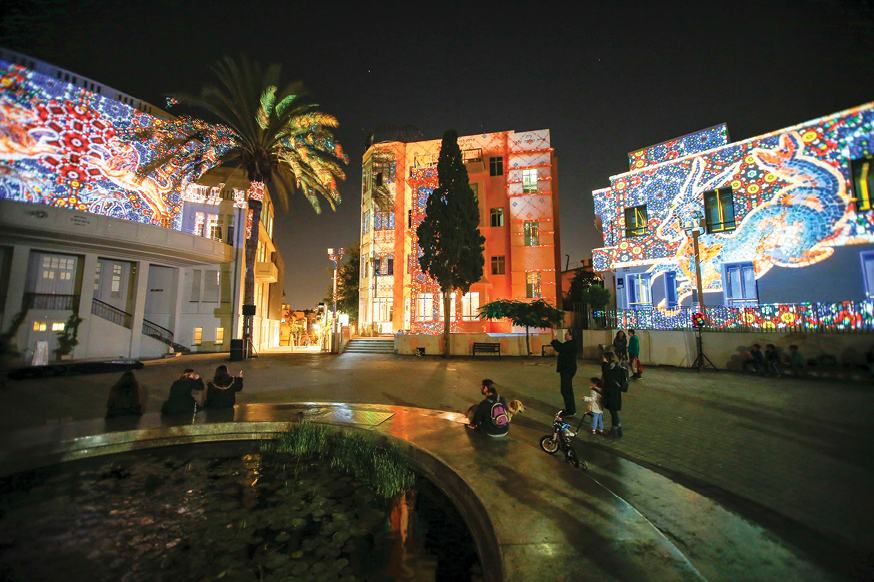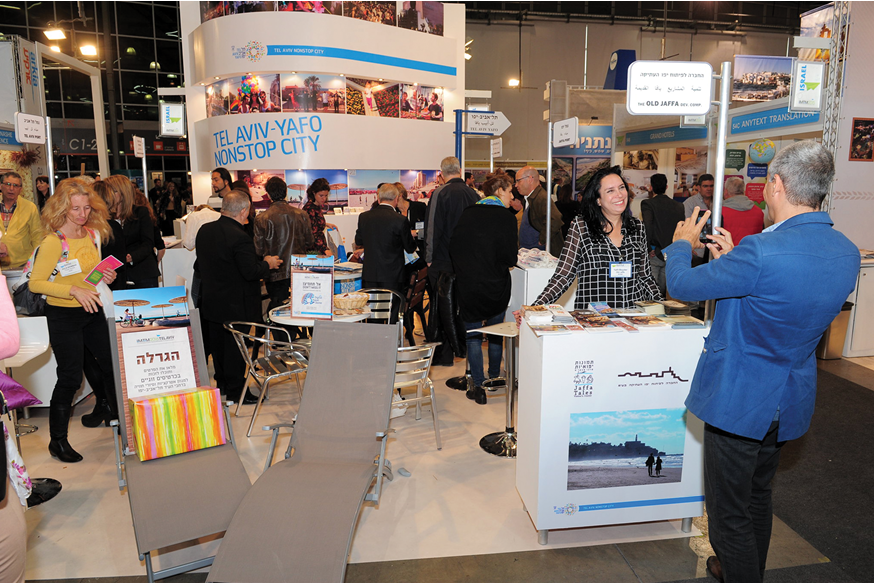- Home
- Media Kit
- Current Issue
- Past Issues
- Ad Specs-Submission
- Ad Print Settings
- Reprints (PDF)
- Photo Specifications (PDF)
- Contact Us

![]()
ONLINE
A Fortress of Democracy
Editors’ Note
Ron Huldai is an Israeli politician and a former high school headmaster and fighter pilot. In the course of his 26 years of military service in the Israeli Air Force, he served as a combat pilot and held several key senior command positions, including Brigadier General. Following his retirement from active duty, he became headmaster of the prestigious Herzliya Hebrew Gymnasium (High School) and remained in office for six years. A member of the Labor Party, Huldai was first elected Mayor of Tel Aviv in 1998, and was reelected in 2003, 2008, 2013 and again in 2018.

The vibrant city of Tel Aviv
How do you describe the Tel Aviv brand?
The slogan of the city expresses its reality: “the city that never sleeps.” There is no one in Israel who is not familiar with this slogan which, as stated, reflects the city’s true nature; it is vibrant, energetic, creative and dynamic; a city of culture and art, great nightlife and culinary richness; a safe city that is pleasant to live in, good to work in and fun to spend time in. The “city that never sleeps” did not create itself, but is the result of very hard and strenuous work – 6 percent of our annual budget is invested in culture and art, including a makeover in infrastructure, upgrading public spaces and encouraging strolling about, policies of encouraging young people and defining recreation areas – all of these have created a city that thrives 24 hours a day, 7 days a week.
Another aspect of the brand has been added in recent years. I always say that if the world was a newspaper, then Tel Aviv would once have been covered in the Culture, Lifestyle, and Tourism pages. However, about a decade ago, we began appearing in other parts of the paper – the Economy and Technology sections. As many know, the State of Israel is known as the “Startup Nation.” As is the case in many countries where there is an important technology sector, the initial phase of this sector – the start-ups – usually flourishes in cities. That is what has happened with us, too. Little Tel Aviv, which is about the size of Manhattan, has about 2,000 start-ups – making us the city with the highest number of companies per capita or per square mile in the world.
These two characteristics – a non-stop city and the city of startups – complement each other and are a center of attraction and interest in our city on a global level.
This is your fifth term as mayor of Tel Aviv. What has made this role so special for you?
A mayor’s job is to do good. We touch on so many aspects of residents’ lives – in the education of their children, in their living environment, in the culture they require. One of the good things about being a mayor is that you get to see the fruits of your labor. Currently, for example, we’re inaugurating the city’s largest football stadium with 29,000 seats; completing the renovation of one of our repertory theaters with three stages; and opening a museum on the White City’s architectural heritage. In what other profession can you dream of a project one night, and the next day get up and make it come true?
However, it is very important to understand that a mayor’s role in the 21st century is much broader than it use to be. Several years ago, I published a joint article with my friend, Mayor of Paris Anne Hidalgo, about the responsibilities of mayors nowadays. In the past, there were issues that were considered “national” and included substantive and fundamental matters, while “municipal” issues were more mundane. The expectation was that the national leadership would navigate the weighty issues, while the mayors would deal with infrastructure and construction, cleanliness and public spaces. Today the situation is different. Governments are waning in power, ceasing to provide services on many issues that were previously in their domain. It’s not that needs have changed. On the contrary, needs have increased. But in many countries of the world, a vacuum is created, which the mayors are required to fill. Mayors are finding themselves operating in new fields, and decisions are needed on issues that were never on their agenda. I always call Tel Aviv “the social home front of Israel” as we provide services not only to our residents, but also to residents from dozens of municipalities around us – giving aid to addicts, special education students, single-parent families, sex workers, street children – everyone is looking for solutions in the big city. We do this out of love and with a sense of responsibility, because we have the financial capacity to do so, but also, unfortunately, because the state does less on these issues.
Moreover, there is a fascinating political phenomenon occurring all over the Western world: national governments headed by conservative leaders, which maintain tense relationships with cities controlled by a progressive political establishment. Look at what’s happening in the United States – nearly all major cities are headed by Democratic mayors, operating policies that are at times contrary to those of the conservative president. The same is true for many European countries, where conservative forces often challenge the values that have guided the countries on the continent since World War II: tolerance, pluralism, the welcoming of immigration, and the blurring of borders between countries. Today, the very belief in democracy and its values is under threat and, in this situation, mayors have a crucial role to serve as a democratic fortress in their nations. In Israel, too, there are forces working to weaken democratic institutions, and I see the role of Tel Aviv as preserving the values that the state was founded on 70 years ago. It is no coincidence that our town square is the main focal point of major political demonstrations in Israel. We invest great efforts to enable freedom of expression and creativity; we work to make every group and minority feel at home in the city; we have established the world’s first municipal community center for the gay community and budgeted for dozens of community activities and groups; we have implemented an affirmative action policy in the municipality for employees from the Arab minority in Israel; and, in addition, we act to ensure at least half of the managers and members of the municipal boards are women. This, if you ask me, is the most important role of a big city – to be a fortress of democracy in a world of increasing extremism.

Will you highlight your efforts in recent years to position Tel Aviv as a global hub of innovation and creativity?
In recent years, our city has experienced an extraordinary economic miracle.
From a local economic center that served the Israeli market, the city has become the father of technology-led companies that attract entrepreneurs and firms from all over the world.
This phenomenon is happening as Israel itself is undergoing an economic upheaval. In the first decades of its existence, Israel was a poor country with few resources, but in the 1990s a revolution began with the growth of the technology sector, the entry of many educated immigrants from the former Soviet Union, and the removal of the Arab boycott. The Israeli government, which recognized the opportunity, developed a very successful system of encouragement and support for technology, and the result is that Israel has become a Startup Nation – a global hub of innovation and creativity.
As is the case with countries with a significant technology sector, many companies – especially small startup companies – concentrate in a big, vibrant city. Along with unprecedented investment in urban infrastructure and the return of young people to the city, Tel Aviv has become Israel’s Startup City. We recognized the opportunity, and decided to leverage it. Our program focuses on two main channels of activity – helping companies and advertising them to the world. In the area of aid, we have lowered the municipal taxes that start-ups pay at the outset; we have opened up the municipal databases to developers; we have inaugurated urban work spaces for entrepreneurs; we create dozens of entrepreneurial events a year and partner with hundreds more happening in the city; and about a year ago, we launched a joint space with Tel Aviv University which serves as the beta site for a trial of Smart Cities technologies.
In the area of exposure, we leverage the media’s and influencers’ great interest in Tel Aviv, and set meetings with investors and decision-makers, providing PR and exposure for dozens of entrepreneurs a year.
The most significant expression of technological growth in the city is the rate of startups operating here: close to 2000 start-ups, which is the highest rate in the world per capita or square mile. Along with these companies, there are dozens of accelerators, more than a hundred international research and development centers, and countless companies offering financial tools, legal aid, foundations, and support services. Today, 1 in 10 employed people in the city works with technology – this is an entire ecosystem with a huge impact on the urban economy.
The municipality under your leadership manages to maintain a balanced budget while investing in infrastructure, public space, and municipal institutions. How have you been able to achieve this?
When I took office in the city, it was in bankruptcy. We could not pay salaries to employees nor to suppliers. After a few difficult years, we made an absolute turnaround and as of today we have enjoyed 17 years of a balanced budget with a surplus. The Israeli affiliate of Standard & Poor’s rated our municipality as Triple A Stable.
How did we do that? First of all, we live on what we have, not on what we don’t have; my parents taught me that. I grew up on a kibbutz, and in today’s terms we were poor. The kibbutz is a kind of Israeli collective that advocates pioneering and manual labor, and my parents were pioneers who came from Poland in the 1920s to establish a kibbutz in Israel along the highway between Jerusalem and Tel Aviv. They and all their friends worked hard and were content with little, and the values that guided them have served me throughout my life.
Today, Tel Aviv is financially sound, and this stability has been achieved thanks to proper management. The budget structure in Israeli cities is different from the American method: we do not have sales tax and we do not receive any of the revenue of businesses in the city. Our revenue is based on property tax based on property size. With our method, residents pay very low taxes, while offices and businesses pay very high taxes and actually fund our ability to provide services to our residents. In the past two decades, there has been tremendous momentum in building commercial spaces and office buildings, greatly increasing the city’s sources of income.
With all the accomplishments you have achieved, do you take moments to reflect on and appreciate what you have been able to do for the city of Tel Aviv?
I am not a nostalgic person. I seldom look back, only forward. My head is still full of projects and my drawer is full of work plans. I get up every morning feeling a great privilege: my job is also my hobby. I love what I do, and I do what I love.![]()